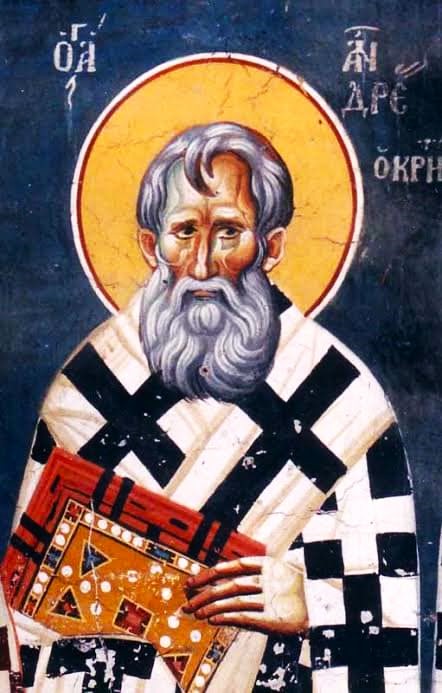The Holy Apostle Andrew – Fr. Gavril Galev
~+~
(Greek: Ανδρεα, brave, strong man, chaste)
He was known as the First-Called Apostle, because he was the first who followed Christ. From an early age, he longed for the divine truth, and that is why when Saint John the Baptist emerged, he immediately became one of his disciples. Saint Andrew was standing on the banks of the Jordan River, when the Forerunner, pointing to Jesus, said: “Behold the Lamb of God!” (John 1, 36). Hearing these words, Andrew wanted to meet Him and spent the whole day with Him. He wanted to share the indescribable joy and the impression he gained from Christ with someone, so he went to his brother Simon (Peter), announcing to him the good news: “We have found the Messiah” (John 1, 41), and brought him to Christ. Later the Saviour saw the brothers on the shores of the Sea of Galilee and called them. “Follow me and I will make you fishers of men!” (Mark 1, 17). Since then, they followed the Saviour everywhere and witnessed His miracles, death and resurrection.
Andrew was a shrewd man, with pure logical thought, balanced, determined and an excellent organizer. That is why during his life he travelled to many countries and everywhere he went he founded local churches. After the Ascension of the Lord, and, the descent of the Holy Spirit, when the Apostles went to different countries to preach the Word of God, the Holy Apostle Andrew went to the northern countries. Through Macedonia, Greece, Asia Minor, along the shores of the Black Sea, he reached the land inhabited by the Scythians, today’s Russia.
According to tradition, when the Holy Apostle reached the Dnieper River, at the place where the city of Kiev is now, while climbing the surrounding hill, he hammered a cross into the ground and said to his disciples: “In this place the grace of God will shine, the churches of Christ will be raised and the true light will come, from here throughout the land.” On that very same hill now stands the church of Saint Andrew the First-Called. He even reached the cities of Heraclius, Chalcedon, and Treisund; he also visited Armenia and Georgia. He also came to the mountains of Ossetia and Abkhazia, preached in Sebastia (present-day Sukhumi), journeyed along the shores of the Black Sea and visited Kherson Taurida (now the Crimean peninsula). After this hard journey, the Holy Apostle Andrew visited Sinop and the cities that lie near the Black Sea. He also visited the city of Byzantium (today’s Constantinople) and there he ordained Stachys as the first bishop, one of the 70 Disciples of Christ. Visiting the cities of Greece, he came to the city of Patras in his old age.
The Holy Apostle Andrew spent some time together with Saint John the Theologian, who was the Apostle in Ephesus, from where he went to Nicaea and stayed there for two years. But his path was not always easy. He also suffered great trials, torments and persecutions. He endured all of them patiently and he testified about Christ everywhere he went; through his word, miracles and the example of his personal life and won new followers. In the Pontus city of Sinop, near the Black Sea, Saint Andrew together with the Holy Apostle Matthew suffered terrible persecution from the Jews. Being filled with malice, because the Disciples of Christ had gained many followers, they slandered them before the authorities. Because of that, they imprisoned them, beat them and threw them out of the city gates. But Christ appeared to them and healed them. Saint Andrew, as if nothing had happened to him, returned to the city and continued to preach again.
After returning to Patras, the city leader Aegeates learned that foreign teachings had spread throughout the city, and even unto his family, so he subjected Saint Andrew to interrogations, torture, dungeons and finally condemned him to death. Later, when all the people revolted en masse, Aegeates was afraid and at his order the servants began to untie the Apostle from the cross. Then Saint Andrew, raising his eyes to heaven, cried out: “O Lord, do not allow, for me to be taken down from the cross and do not deprive me of a death similar to Yours! Receive me in peace in your eternal settlements!” After saying this words, the Apostle surrendered his spirit to God and his face shone in the light of the heaven. Andrew was crucified on a cross in the form of an X.
The Apostle dedicated his whole life to preaching. Wherever he passed, he preached and organised a local church community. He was a tireless worker in the field of God, he preached, healed the sick, cast out unclean spirits, taught the new converts to be merciful to foreigners and their slaves and to have love for everyone. The meekness and benevolent life of the Holy Apostle rose like a bright pillar to the sky and radiated light and warmth, with which he attracted the people, who whilst listening to him, addressed him: “You are truly a disciple and friend of the good and merciful God and He speaks through your mouth!” The Holy Apostle Andrew, the First-Called Apostle is celebrated on November 30th according to the Julian calendar (13 December according to the Gregorian calendar).
Fr. Gavril Galev
Abbot of the Monastery “St. Clement of Ohrid”,
Kinglake, Melbourne, Australia

